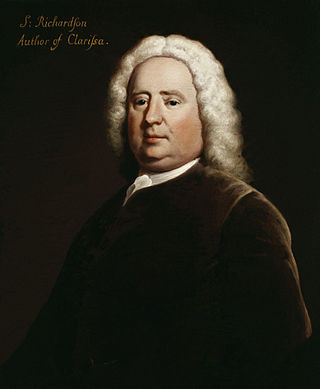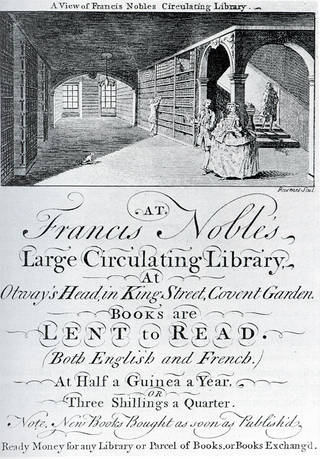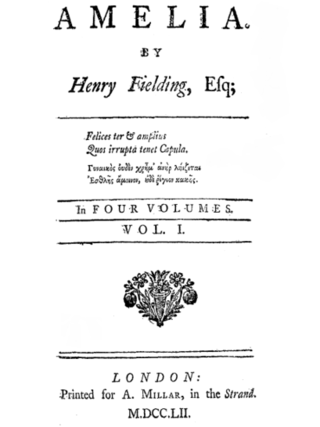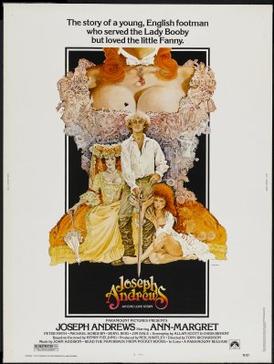
An epistolary novel is a novel written as a series of letters between the fictional characters of a narrative. The term is often extended to cover novels that intersperse documents of other kinds with the letters, most commonly diary entries and newspaper clippings, and sometimes considered to include novels composed of documents even if they do not include letters at all. More recently, epistolaries may include electronic documents such as recordings and radio, blog posts, and e-mails. The word epistolary is derived from Latin from the Greek word epistolē, meaning a letter (see epistle). This type of fiction is also sometimes known by the German term Briefroman or more generally as epistolary fiction.

Henry Fielding was an English writer and magistrate known for the use of humour and satire in his works. His 1749 comic novel The History of Tom Jones, a Foundling was a seminal work in the genre. Along with Samuel Richardson, Fielding is seen as the founder of the traditional English novel. He also played an important role in the history of law enforcement in the United Kingdom, using his authority as a magistrate to found the Bow Street Runners, London's first professional police force.

Samuel Richardson was an English writer and printer known for three epistolary novels: Pamela; or, Virtue Rewarded (1740), Clarissa: Or the History of a Young Lady (1748) and The History of Sir Charles Grandison (1753). He printed almost 500 works, including journals and magazines, working periodically with the London bookseller Andrew Millar. Richardson had been apprenticed to a printer, whose daughter he eventually married. He lost her along with their six children, but remarried and had six more children, of whom four daughters reached adulthood, leaving no male heirs to continue the print shop. As it ran down, he wrote his first novel at the age of 51 and joined the admired writers of his day. Leading acquaintances included Samuel Johnson and Sarah Fielding, the physician and Behmenist George Cheyne, and the theologian and writer William Law, whose books he printed. At Law's request, Richardson printed some poems by John Byrom. In literature, he rivalled Henry Fielding; the two responded to each other's literary styles.

Elizabeth Barry was an English actress of the Restoration period.

Colley Cibber was an English actor-manager, playwright and Poet Laureate. His colourful memoir An Apology for the Life of Colley Cibber (1740) describes his life in a personal, anecdotal and even rambling style. He wrote 25 plays for his own company at Drury Lane, half of which were adapted from various sources, which led Robert Lowe and Alexander Pope, among others, to criticise his "miserable mutilation" of "crucified Molière [and] hapless Shakespeare".

The History of the Adventures of Joseph Andrews and of his Friend Mr. Abraham Adams, was the first full-length novel by the English author Henry Fielding to be published and among the early novels in the English language. Appearing in 1742 and defined by Fielding as a "comic epic poem in prose", it tells of a good-natured footman's adventures on the road home from London with his friend and mentor, the absent-minded parson Abraham Adams.
This article contains information about the literary events and publications of 1741.
This article contains information about the literary events and publications of 1742.

Theophilus Cibber was an English actor, playwright, author, and son of the actor-manager Colley Cibber.

Augustan prose is somewhat ill-defined, as the definition of "Augustan" relies primarily upon changes in taste in poetry. However, the general time represented by Augustan literature saw a rise in prose writing as high literature. The essay, satire, and dialogue thrived in the age, and the English novel was truly begun as a serious art form. At the outset of the Augustan age, essays were still primarily imitative, novels were few and still dominated by the Romance, and prose was a rarely used format for satire, but, by the end of the period, the English essay was a fully formed periodical feature, novels surpassed drama as entertainment and as an outlet for serious authors, and prose was serving every conceivable function in public discourse. It is the age that most provides the transition from a court-centered and poetic literature to a more democratic, decentralized literary world of prose.

Charlotte Charke was an English actress, playwright, novelist, and autobiographer. She began acting at the age of seventeen in breeches roles, and took to wearing male clothing off stage as well, performing and being publicly known as "Charles Brown" from 1741. Her later career and her writings were conducted under her own name, "Mrs. Charlotte Charke", and identified her as the daughter of Colley Cibber. After being unsuccessful in a series of jobs associated with men at the time, such as valet, sausage maker, farmer, and tavern owner, she succeeded in her career as a writer and continued her work as a novelist and memoirist until her death in 1760.
The sentimental novel or the novel of sensibility is an 18th and 19th century literary genre which celebrates the emotional and intellectual concepts of sentiment, sentimentalism, and sensibility. Sentimentalism, which is to be distinguished from sensibility, was a fashion in both poetry and prose fiction beginning in the eighteenth century in reaction to the rationalism of the Augustan Age.

Pamela; or, Virtue Rewarded is an epistolary novel first published in 1740 by the English writer Samuel Richardson. Considered one of the first true English novels, it serves as Richardson's version of conduct literature about marriage.

Amelia is a sentimental novel written by Henry Fielding and published in December 1751. It was the fourth and final novel written by Fielding, and it was printed in only one edition while the author was alive, although 5,000 copies were published of the first edition. Amelia follows the life of Amelia and Captain William Booth after they are married. It contains many allusions to classical literature and focuses on the theme of marriage and feminine intelligence, but Fielding's stance on gender issues cannot be determined because of the lack of authorial commentary discussing the matter. Although the novel received praise from many writers and critics, it received more criticism from Fielding's competition, possibly resulting from the "paper war" in which the author was involved.

The Author's Farce and the Pleasures of the Town is a play by the English playwright and novelist Henry Fielding, first performed on 30 March 1730 at the Little Theatre, Haymarket. Written in response to the Theatre Royal's rejection of his earlier plays, The Author's Farce was Fielding's first theatrical success. The Little Theatre allowed Fielding the freedom to experiment, and to alter the traditional comedy genre. The play ran during the early 1730s and was altered for its run starting 21 April 1730 and again in response to the Actor Rebellion of 1733. Throughout its life, the play was coupled with several different plays, including The Cheats of Scapin and Fielding's Tom Thumb.

Mr. Frank, the Underground Mail-Agent is an 1853 parody novel written by an unknown author credited as "Vidi".

The Anti-Pamela; or Feign'd Innocence Detected is a 1741 novel written by Eliza Haywood as a satire of the 1740 novel Pamela; or, Virtue Rewarded by Samuel Richardson. It has also been presented with the subtitle "Mock-Modesty Display'd and Punish'd."

Joseph Andrews is a 1977 British period comedy film directed by Tony Richardson. It is based on the 1742 novel Joseph Andrews by Henry Fielding.

Pamela in Her Exalted Condition is Samuel Richardson's 1742 sequel to his novel, Pamela; or Virtue Rewarded. Richardson wrote the novel as a response to criticisms of his original work, continuations written by other authors, and readers' desire to read about the life of the protagonist, the 15-year-old former maid, Pamela, after her ascent into genteel life following her marriage to and reformation of the rakish Mr. B from the original novel. Richardson's sequel explores debates and questions about the roles of women and the challenges Pamela faces in her new life as a wife, mother, and member of the upper class. The novel was a critical and commercial failure.
















